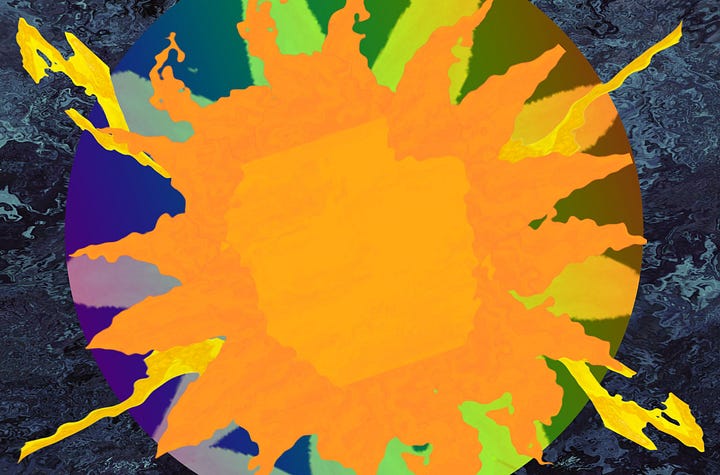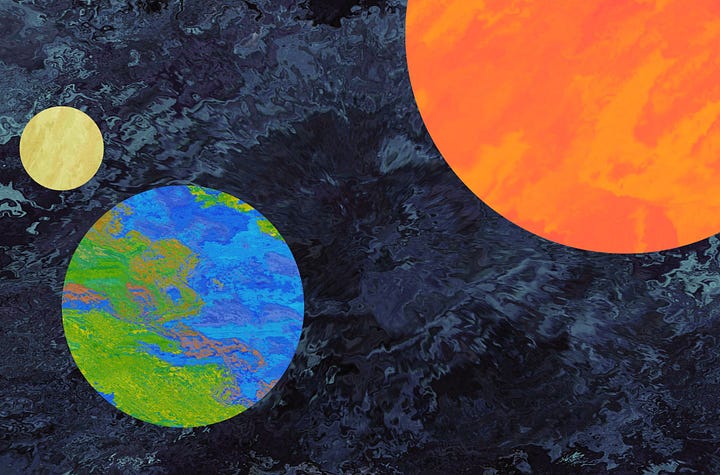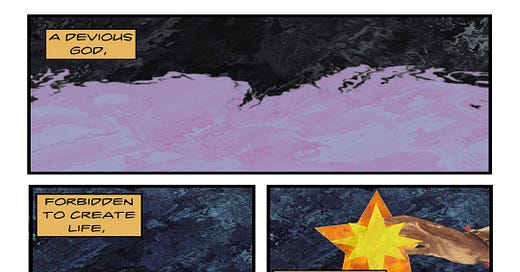Hello, Playwrites of the Cosmos!
How are you arranging reality today?
a devious god,
forbidden to create life,
hid the precursors
in the stars of the cosmos
supernovas birthed us all
Tanka—Haiku’s Stocky Cousin
Today, I’d like to introduce you to the tanka, it’s a form of poetry related to haiku, and it also has deep roots in the Japanese poetry tradition.
A tanka is a five-line poem. Traditionally, the lines follow a syllable pattern of 5-7-5-7-7. (However, just like with haiku, you should feel free to break the rules.) A tanka looks like a haiku with two extra seven-syllable lines tacked onto the end—and that is how some people write them. Some poets, and at least one poetry journal, tongue-in-cheek, refer to tanka as a failed haiku.
In the Japanese tradition, the last two lines are expected to provide some deep illumination on the first three lines either through commentary or further explication of the poem’s theme.
In the English language, five-line poems1 have a rich heritage, and often the shortest non-haiku English language poems have five lines. Tanka fits neatly into this tradition.
While I’ve written far fewer tanka than haiku, I’m working on closing the gap a bit. I like to use tanka to tell three-act stories, where one of the acts is only one line. In today’s poetry comic, the first act of the story is lines one and two:
a devious god,
forbidden to create life,
The second act plays out in the third and fourth lines:
hid the precursors
in the stars of the cosmos
The fifth line is the entire third act:
supernovas birthed us all
The story at the heart of this poem is not something I could adequately squeeze into a three-line haiku. It’s a much bigger story. If haiku is the poetry of noticing a moment, tanka is the poetry of noticing a drama.
Have you ever written a tanka? Why not write one today? If you want, here’s a prompt to get you started:
Write a tanka (5 lines with a syllable pattern of 5-7-5-7-7) about the time you were the most afraid of nature.
Artist Note
I’ve always been intrigued by creation myths. I love the variety of stories humans have shared about the origins of the universe. This poem was inspired by Carl Sagan’s quote, “We’re made of star stuff.”
I had a hard time figuring out the order of these panels. I kept flipping panels four and five:


Storywise, it makes sense for the supernova panel to go first, as that precedes the creation in the poem, but I thought the placement of the text of the poem’s last two lines called for the order I eventually went with. This meant the word “supernova” would appear next to my rendition of the moment right before the supernova occurred. My guiding principle in these matters is always to ask what makes for the best reader experience. Does it matter? 🤷
The last panel was inspired by one of my favorite NASA images. It was taken by the James Webb space telescope, and is called The Cosmos:
Lastly, every time I write about Carl Sagan, I feel obligated to share one of my favorite songs by one of my favorite artists. The lyrics to this song capture internet life better than anything else. The song is Carl Sagan by Regna del Cid, and you can find the lyrics below this clip:
Hey
How are you?
Are you scrolling alone inside your room
Is your heart good
or did something go and break it?
Well in the words of Carl Sagan
we're all just stars and bacon
that's not quite what he said
but it's trueHey
You're still here
Are you like me
on this app so you can be
lost and numb
in a warm bath made of content
watching brilliant bits of nonsense
because it feels like making contact?
Or maybe that's just me
How are you?We are billions and billions
of lights reaching out
from a satellite just to know
that feeling
that even
when we're cold and on our own
we're not alone
not aloneHey
Are you alright?
Are you scrolling alone again tonight?
You'll be fine
even if your heart is breaking
You've got me and Carl Sagan
and his famous postulation
that if we're all alone in space
it'd be an awful waste
so I'm just signing to say
How are you?
Be the weird you want to see. in the world!
Cheers,
Jason
Often five-line poems are generically referred to as cinquain. However, this term is sometimes used to refer exclusively to five-line poems that employ one of three rhyme schemes: ababb, abaab or abccb.







All of us, just star-stuff and bacon. 💫🥓 What a great combo!